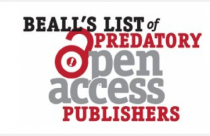Predatory Publishing: The Cancer Continues to Spread

A predatory publisher is usually an open access journal. They charge authors article processing fees. These predatory journals collect fees without doing any peer review. Many academic authors publish in these predatory journals. Often, they don’t know that the journal is only pretending to conduct peer review. In addition, reviewers make decisions about academic promotions based on publications. They are also important for tenure-track staff.
Who Are Predatory Publishers?
Predatory journals have been widely criticized. They collect money for a service they do not give. This deception means that they often publish poor quality research. Readers who are unaware may rely on these publications. This could negatively affect the work that these readers do. Despite this, the number of articles in predatory journals is rising. About 400,000 papers were published in 8,000 predatory journals in 2014.
Many young scientists publish in predatory journals because they are not aware of how they operate. In addition, getting published in such a journal is easy which makes them attractive in a publish or perish environment. Academic authors often have their work rejected. However, an easy acceptance from a predatory publisher can feel good. This will only last until the author finds out that the journal is predatory.
Some authors also know that the journal where they submitted their work to is predatory. They may choose a predatory publisher in response to the need to publish. Predatory publishers offer an easy, quick publication. Moreover, publications are required for academic promotion. If the journal is not scrutinized by your university, this can be one way to meet the requirements for the tenure track.
The Impact of Predatory Journals
Predatory journals can cause mistrust in open access journals. Genuine open access journals also charge authors a publication fee. The main difference is they perform rigorous peer review. It can be hard for researchers to identify predatory open access journals. This was partly addressed by Jeffrey Beall who had a blog where he listed over 1,155 suspected predatory journals. However, this blog is now taken down and no longer available.
Apart from mistrust, what impact do predatory journals have? A recent paper gives some answers on this matter. Academic authors publish so that their work can be made public. Predatory journals help authors make their work public. However, the damage is usually done to the author’s reputation. There is a perception that work accepted by a predatory publisher would not be accepted anywhere else. Other researchers may look down on someone who has work in a predatory journal.
The journal in which a researcher publishes is often used to decide on academic promotions. It would take a lot of time to assess each paper of the researcher. One way to speed this process up is for the reviewer to simply see how many reputable journals the researcher has published in. If the researcher has many papers in good journals, the reviewer could assume that the researcher should be promoted.
When poor quality research is published in a predatory journal, the general public might be deceived. However, when the paper is obviously bad, it makes it clear that there was no peer review. Moreover, when the paper is of a higher quality, it can be hard for readers to see flaws in the research. This could be a problem if a reader were to apply the fraudulent research.
Publishing data in predatory journals add to the difficulty of being able to identify trustworthy information online. We live in an era of fake news. These journals have many of the typical traits of a scientific journal. They publish articles, have editorial boards, and claim to do peer review. When they publish faulty studies, they may erode trust.
What Can We Do?
Predatory publishers are a growing problem. However, they point to issues within academia. Without this emphasis on the number of publications, fewer researchers might publish in predatory journals. Decisions about tenure-track positions should be based on the quality of a researcher’s work. Academic promotions should not be based on the number of publications. Promotions should not be decided based on where a researcher publishes.
We have to stop assuming that the journal in which a paper is published in is a measure of its quality. This is the reason why researchers are often reminded that a journal’s impact factor is not a true indication of an article’s value. We need alternative ways to assess the usefulness of a paper. For example, how often a paper has been cited is a better clue to its value than the journal’s impact factor.
Predatory publishers damage the open access industry. They make it harder for true scientific journals to gain the trust of authors who want to publish in an open access journal. The damage done by predatory journals can also be used by traditional journals to convince researchers to avoid the open access route. Open access is important for researchers all over the world. Any steps towards keeping information hidden does not advance science.
Predatory publishers are open access but do not conduct peer review. They often publish low quality work. Academic authors may be tricked into publishing in a predatory journal. When the true nature of the journal comes to light, it may interfere with academic promotion or tenure-track decisions. This would be less of a problem if the quality of an article was not assumed based on the journal it was published in.
Have you received invitations to publish from predatory publishers? Do you also think that it is difficult to identify these fake journals? Share your thoughts with us in the comments below!







